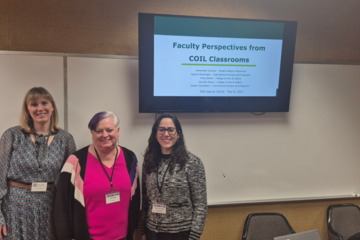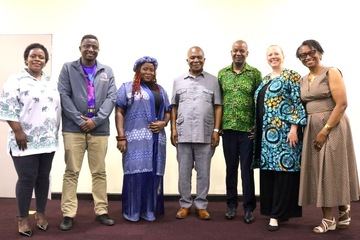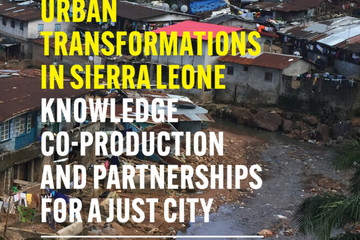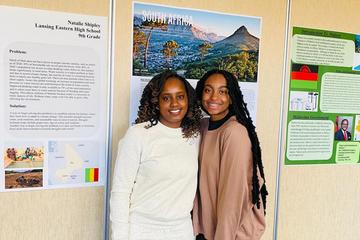
Baboki Gaolaolwe-Major
(Alliance for African Partnership)
Administrative Assistant
Communication
Education
Governance
Marketing
The Business of Water: A COIL Project By AAP
Collaborative Online International Learning (COIL) is a method of education which fosters intercultural learning and development through shared values, presented perspectives, and mutual understanding despite geographical and cultural barriers. It connects students and professors in different countries for collaborative projects and discussions carried out virtually as part of their coursework. As an educational innovation, it reflects the values and goals of the Alliance for African Partnership (AAP) to foster mutually beneficial programs which catalyze lasting partnerships among our consortium members, which is why AAP launched the COIL Faculty Fellows Program-Africa in 2023. Since 2023, AAP along with Michigan State University’s (MSU) Global Youth Advancement Network have supported 14 teams of faculty to design and implement COIL projects.
The highly successful“The Business of Water” COIL project implemented by faculty from MSU and the University of Nigeria Nsukka is a great example of the type of impact COIL can have on both faculty members and students The project comprised 30 students from UNN and MSU, and led by Antoinette Tessmer OF THE Broad College of Business (Finance Dept.), Michigan State University and Nkadi Onyegegbu, Faculty of Education (Science Education Dept.), University of Nigeria Nsukka (Nigeria). It’s aim was to teach students the factors and events that control “The Business of Water” both in their universities and in their communities. UNN and MSU students communicated through online methods such as Zoom or WhatsApp, and they collected data through site visits and interviews among other methods.
Over the course of six weeks, the students learned the intricacies of specific water-based businesses, such as the drinking water industry and the water recycling industry, using the Environmental Social Governance (ESD) framework to structure their research and to later propose a call to action based upon their findings.
By the end of the COIL project, the students and facilitators had engaged and collaborated to such a degree that contacts, bonds and partnerships were formed, breaking through the cultural and international barriers. When giving their experiences on the project, some students wrote the following:
“At the end of the day, we pushed others in new ways of understanding and collaboration that will impact us after we graduate”
“This was my first experience collaborating with international students overseas and I can gladly say that COIL was the online tool that made it possible”
“This experience has highlighted mutual respect and honesty, allowing us to work together on relevant and environmentally sustainable solutions...I feel more equipped to contribute to global discussions”
“These problems also taught me how to communicate with people from different cultures and helped grow my interpersonal skills”
By the metric of engaging students in the “Business of Water” as well as forming intercultural bonds, the AAP has deemed this COIL project another success, among many, and is excited to champion more COIL projects to come.
By:
Baboki Gaolaolwe-Major
Wednesday, Jul 23, 2025
YOUTH EMPOWERMENT
+1

Leave a comment
Celebrating a Legacy of Vision, Dedication, and Continental Impact
We take this opportunity to honour one of our most visionary leaders, Professor Richard Mkandawire, who retires after years of exceptional service as the Director of the AAP Africa Office, as the Alliance for African Partnership (AAP) continues to grow in strength and purpose. The experience Professor Mkandawire has had with AAP has been nothing short of revolutionary. Richard was a well-known development expert and supporter of soil health who approached his work with insight, moral character, and endless enthusiasm. AAP has become a reliable forum for cooperative research, policy engagement, and capacity building as a result of his dedication to cultivating partnerships throughout Africa. He oversaw the expansion of the AAP throughout African institutions, fostering connections between policy, academia, and the public. From empowering young researchers to advocating for agricultural reform and ensuring soil health remained a top priority for food security on the continent, Richard's enthusiasm for Africa's prosperity was evident in every project he supported. Partners, mentees, and colleagues from around the world gathered at his farewell dinner, held on the last night of the AAP Consortium Meeting 2025 in Lilongwe, Malawi, to honor a man whose work has left a legacy. He was described as a leader, a mentor, and most importantly, a true servant of Africa, in the flood of tributes that poured in. Richard Mkandawire, AAP honors you. Your legacy will continue to inspire, your vision will keep guiding us, and your influence on the lives you have impacted and the organizations you have influenced will only grow. Richard, thank you. We wish you a peaceful, happy, and well-earned retirement.
By:
Baboki Gaolaolwe-Major
Thursday, Jul 10, 2025
AGRI-FOOD SYSTEMS
+2

Leave a comment
CALL FOR PAPERS, JOURNAL OF WEST AFRICAN HISTORY
CALL FOR PAPERS, JOURNAL OF WEST AFRICAN HISTORY
Journal of West African History•01/09/2025Announcement
Location
Michigan, United States
Subject Fields
African History / Studies
CALL FOR PAPERS, JOURNAL OF WEST AFRICAN HISTORY
Founding Editor-in-Chief: Nwando AchebeEditors: Saheed Aderinto, Trevor R. Getz, Toby Green, Vincent Hiribarren, Harry Nii Koney Odamtten. Book Review Editors: Mark Deets, Nana Kesse, Madina Thiam.
The Journal of West African History (JWAH) is a peer-reviewed, interdisciplinary research journal dedicated to publishing high-quality scholarship on West African history. Positioned at the forefront of new research, JWAH addresses representation gaps by fostering critical scholarship on topics such as women and gender, sexuality, slavery, oral history, popular and public culture, and religion. The editorial board invites submissions that engage diverse topical, theoretical, and methodological approaches. Committed to rigorous analysis and international in scope, JWAH offers a critical intervention in knowledge production. Each issue includes scholarly book reviews, and articles are published in English, French, and Portuguese, with African-language abstracts. JWAH is published by Michigan State University Press.
The editorial board invites scholars to submit original article-length manuscripts (not exceeding 10,000 words including endnotes) accompanied by an abstract that summarizes the argument and significance of the work. Review essays should engage the interpretation, meaning, or importance of an author’s argument for a wider scholarly audience. See what we have available for review on our Book Reviews page. Please contact our Book Review Editors at mark.deets@aucegypt.edu, madina.thiam@nyu.edu, or nkesse@clarku.edu for more information.
Manuscripts submitted to the Journal of West African History should be submitted online at https://ojs.msupress.org/index.php/JWAH/submission/wizard. In order to submit an article, you will have to create an account. The site will guide you through this process.
Contact Email
jwah@msu.edu
By:
Baboki Gaolaolwe-Major
Wednesday, Jan 15, 2025
CULTURE AND SOCIETY
No Preview Available
Leave a comment
Announcing Journal of West African History, Volume 10, Issue 1
Journal of West African History
Announcement Type
Journal
Location
MI, United States
Announcing Journal of West African History, Volume 10, Issue 1
Founding Editor-in-Chief: Nwando AchebeAssociate Editors: Saheed Aderinto, Trevor R. Getz, Toby Green, Vincent Hiribarren, Harry Nii Koney Odamtten. Book Review Editors: Mark Deets, Madina Thiam, Nana Kesse.
Volume 10, Issue I, NOW AVAILABLE!
The Journal of West African History (JWAH) is an interdisciplinary peer-reviewed research journal that publishes the highest quality articles on West African history. Located at the cutting edge of new scholarship on the social, cultural, economic, and political history of West Africa, JWAH fills a representational gap by providing a forum for serious scholarship and debate on women and gender, sexuality, slavery, oral history, popular and public culture, and religion. The editorial board encourages authors to explore a wide range of topical, theoretical, methodological, and empirical perspectives in new and exciting ways. The journal is committed to rigorous thinking and analysis; is international in scope; and offers a critical intervention about knowledge production. Scholarly reviews of current books in the field appear in every issue. JWAH publishes primarily in English but recently published its first French issue. JWAH also plans to publish articles in Portuguese and is experimenting with African-language abstracts in forthcoming issues. JWAH is published by Michigan State University Press.
Editor's Introduction
Nwando Achebe, “Amaechina”
Articles
Cassandra Mark-Thiesen, “Progressive Empire?: Liberian Agriculture, Black American Farming Experts and World War II Engaging Africa and the World”
Emmanuel Asiedu-Acquah, “Engaging Africa and the World”
Caroline Maguire, “Artification and Decolonization at the Musée d’Art Africain de l’IFAN, Dakar”
Sarah Zimmerman, “Legacies of French Colonial Militarization and Gender-Based Violence in the Sahel”
Riina Turtio, “Soviet Military Assistance to Mali and Guinea, 1958-1980”
Book Reviews
Transcripts of the Sacred in Nigeria: Beautiful, Monstrous, Ridiculous (by Nimi Wariboko), Reviewed by Tara Hollies.
State-building and National Militaries in Postcolonial West Africa: Decolonizing the Means of Coercion 1958–1974 (by Riina Turtio), Reviewed by Joe Gazeley.
Letters, Kinship, and Social Mobility in Nigeria (by Olufemi Vaughan), Reviewed by Lisa Lindsay.
Mieux vaut tard que jamais: Sur les traces de six tirailleurs guinéens fusillés à Clamecy en juin 1940 (by Daniel Couriol), Reviewed by Madia Thomson.
Decolonizing Independence: Statecraft in Nigeria's First Republic and Israeli Interventions (by Lynn Schler), reviewed by Rouven Kunstmann.
Submissions
The editorial board invites scholars to submit original article-length manuscripts (not exceeding 10,000 words including endnotes) accompanied by an abstract that summarizes the argument and significance of the work. Review essays should engage the interpretation, meaning, or importance of an author’s argument for a wider scholarly audience. Please contact our Book Review Editors at mark.deets@aucegypt.edu, madina.thiam@nyu.edu, or nkesse@clarku.edu for more information.
Contact Email:jwah@msu.edu
By:
Baboki Gaolaolwe-Major
Wednesday, Jan 15, 2025
CULTURE AND SOCIETY
+1
No Preview Available
Leave a comment
Tackling Urban Challenges in Freetown
With over 1 million residents, Freetown, Sierra Leone’s capital, faces critical challenges in housing, infrastructure, and service provision—issues intensified by climate change. Many residents live in informal settlements; up to 70% of the population works in the informal sector.
In response, the Sierra Leone Urban Research Centre (SLURC) was established in 2015 to address these pressing issues through research, capacity building, and advocacy, focusing on health, land, housing, and mobility. SLURC has become a vital platform for dialogue, bringing together urban stakeholders to shape Freetown’s future.
Urban Transformations in Sierra Leone captures SLURC’s impactful journey, showcasing key findings from diverse research projects and highlighting the power of transdisciplinary collaboration.
Discover how knowledge and partnerships are reshaping Freetown.Download the book for free: https://ow.ly/AivJ50UlstO
By:
Baboki Gaolaolwe-Major
Saturday, Dec 7, 2024
CULTURE AND SOCIETY
+1

Leave a comment
Advancing African Entrepreneurship Through Research and Mentorship- Anastasia Mamanbulo
Anastasia Mamabolo, Associate Professor at the Gordon Institute of Business Science (GIBS) and at the University of Pretoria, is a visionary leader in entrepreneurship. Her work is shaping how entrepreneurship is taught and highlighting the critical role of research and mentorship in driving economic growth across Africa.
Anastasia's research identifies the essential skills entrepreneurs need at different stages of their ventures. “My research looks at the skills entrepreneurs require when they start their businesses and how these skills evolve as the businesses grow,” she shared. Her work has resulted in a comprehensive framework that training institutions can use to measure and develop entrepreneurial skills, ensuring tailored support for aspiring business owners.
One of her proudest achievements is the publication of a paper on the role of religion in entrepreneurship, which was recognized as the Best Paper for 2022 by the Journal of World Business. “This recognition is a testament to the relevance of understanding not just the economic but also the cultural and spiritual dimensions of entrepreneurship in Africa,” she said.
In addition to her research, Anastasia was recently appointed the APSA Chair of Entrepreneurship at GIBS, a role that will enable her to lead several initiatives, including a school incubation program for entrepreneurial training and the development of an African Entrepreneurship Index. “This index will measure the competencies of entrepreneurs across Africa, helping us build a credible database that researchers and practitioners can use to improve entrepreneurial development,” she explained.
AAP’s Role in Her Journey
Anastasia’s journey as a researcher has been significantly shaped by the Alliance for African Partnership (AAP). Introduced to AAP by her former dean, Professor Nicola Klein, Anastasia participated in the African Futures Research Leadership Program, which provided her with the opportunity to focus on her research, gain mentorship, and collaborate with international scholars.
“The mentorship I received through AAP was invaluable,” Anastasia emphasized. Under the guidance of Professor Jerry McNamara, a leading strategy scholar, she learned how to conduct high-quality research that resonates with both African and global audiences. “AAP helped me build my confidence as a scholar, gave me an academic voice, and equipped me to bridge the gap between research and practice,” she added.
The Future: Strengthening African Entrepreneurship
Looking to the future, Anastasia envisions becoming a thought leader in African entrepreneurship research. “We don’t have enough research on the incredible entrepreneurial activities happening across the continent,” she said. “My goal is to strengthen the voice of African researchers in this field and foster collaborations that will advance entrepreneurship.”
She also plans to focus on bridging the gap between academia and practice by supporting students in their research efforts, developing actionable insights for entrepreneurs, and continuing her work through the APSA Chair to promote financial inclusion and access to resources for African entrepreneurs.
Advice for Early Career Researchers
Reflecting on her journey, Anastasia emphasized the importance of mentorship and the integration of research into academic work. “Mentorship is crucial for early-career researchers. I was fortunate to have a mentor who guided me through academia, helping me position myself as a research-focused academic,” she noted.
Her advice to young scholars? “Don't neglect your research. Incorporate it into your teaching, and don’t be afraid to seek mentorship—even from those outside your field. It’s through collaboration and consistent research efforts that you’ll grow and make meaningful contributions.”
Anastasia’s work exemplifies the impact of research, mentorship, and dedication to advancing entrepreneurship in Africa. With her leadership, the future of African entrepreneurship looks promising and filled with potential for growth and innovation.
By:
Baboki Gaolaolwe-Major
Tuesday, Nov 12, 2024
EDUCATION


Leave a comment